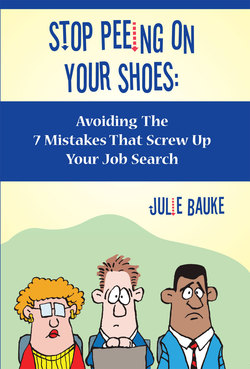Читать книгу Stop Peeing On Your Shoes- Avoiding the 7 Mistakes That Screw Up Your Job Search - Julie JD Bauke - Страница 7
На сайте Литреса книга снята с продажи.
Why are you out of a job? aka The Departure Statement
ОглавлениеWhat happened at your old job? Why are you unemployed? Why did you leave? Why you? Did you do something bad? Okay, the last one will never be asked directly. But don’t kid yourself, the people you will be talking to are suspicious. Unless everyone in your department or company was let go all at once, the question is lurking. Most people are just too polite to verbalize it.
You have to be ready with an answer that is positive (or at least neutral). Your answer must reassure people, as much as possible, that it was not something you had done. And if it was your performance that led to you being let go, how you answer that question is critical. In this case, HOW you say something is at least as important as WHAT you say.
“Bitter and angry” do not rank very highly on hiring managers’ list of key qualities they look for in their next employee. Your networking contacts will not refer “bitter and angry” people for open positions inside their companies, or to other people in their network. It’s okay to feel bitter or be angry. But reserve those conversations and venting exercises for your very closest friends and family. Those feelings are completely normal, but they are certainly not productive. If you feel angry and bitter right after you are let go, avoid discussing your departure until you can at least talk about it without throwing in choice words for your old manager, and/or crying.
Here are some examples of the good and the bad:
Situation: A CFO (Chief Financial Officer) was removed from his job after 10 years with the company when a new CEO was hired. The new CEO wanted to bring in the CFO he had worked with at his former company.
Believe me, this happens all the time. In the senior executive ranks, either it has happened to you, or it has happened to some other executive in your circle. That means the chances are good that the person listening to your departure story is somewhat sympathetic to your circumstances. The way you answer their questions about the situation will either confirm that their sympathy is warranted…or turn them off to your plight. Let’s look at the wrong way, and the right way, to answer the “departure question.”
Mr. Bitter and Angry: “Last Spring, the Board, in it‘s infinite wisdom, decided to bring in this guy from outside the industry. He had virtually no knowledge of our products, or our customers. After a few months on the job, he started axing the very people who had built the company. He threw out everybody, including me, who had any clue what was going on. Then he replaced us with his cronies. I tried to talk him out of it, but he was too stubborn to listen. So, after ten years, I was let go.”
Mr. Prepared: “Last Spring, our Board brought in a new CEO. After he had been on the job for a few months, he started bringing in people that he had worked with in the past. As you know, that happens a lot in these situations. Over the past several months, he has replaced four out of the top five leaders in the company, including me. Of course, I was disappointed. But I had ten good years at the company. I learned a lot, and I accomplished quite a bit. My experiences there have put me in a position where I can move into the top finance role at a new organization, and contribute immediately.
Put yourself in the shoes of the interviewer and re-read those statements. Which person would you be more likely to hire? You do not want to put the interviewer in the position of deciding whether he should believe you. The interviewer may be sympathetic to your plight. But his goal is not to help you feel better about what happened. For him, it is all about moving forward, NOT about the woes of your past. That is Not. His. Problem. Get your sympathy from your spouse, your close friends, or your dog. Let your interviewers and networking contacts see that you are focused on the future and ready to move on from the past.
Obviously, some situations are much easier to explain. For example, a massive layoff, or a company that closed down completely is very easy to explain. But you need to be ready for the “departure question”, no matter what.
